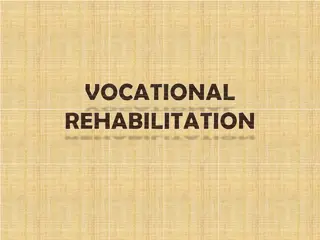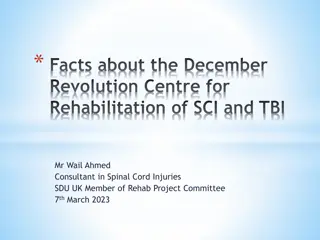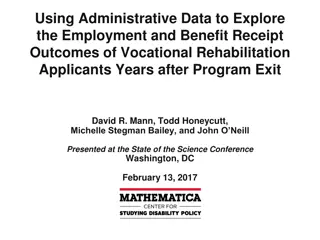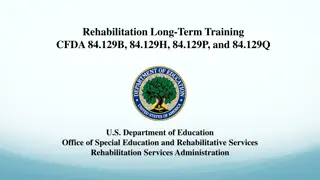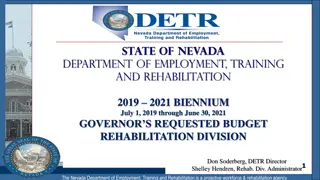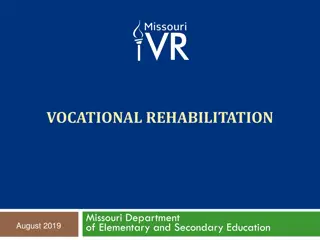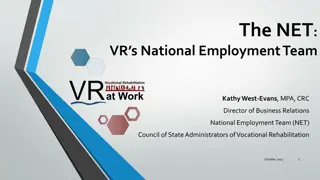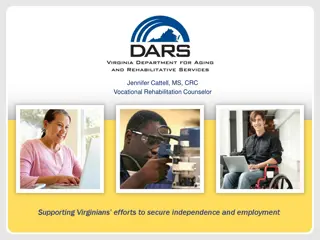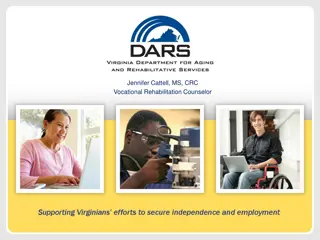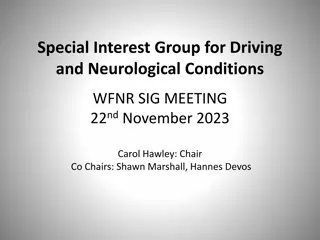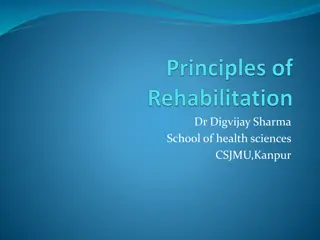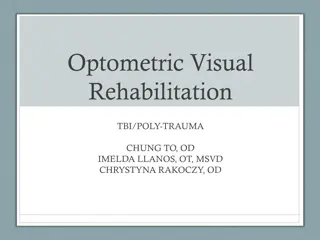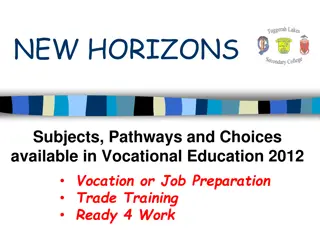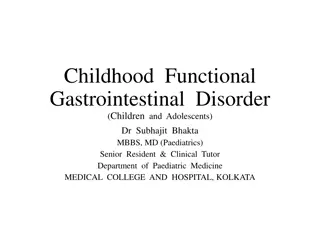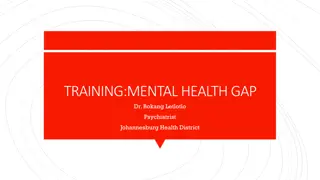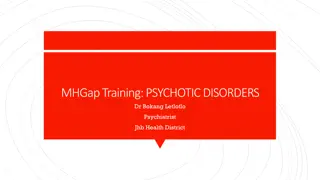Understanding Neurological Disorders and Vocational Rehabilitation
Explore the vocational profile of major neurological conditions such as Traumatic Brain Injury, Epilepsy, Stroke, Multiple Sclerosis, and Autism. Learn about the work return rates, predictors of successful employment, and the mission of NVSU in providing employment services to individuals with neurological disabilities. Discover the history of NVSU and its accredited programs in vocational rehabilitation. Gain insights into the staffing and client services offered by NVSU for comprehensive vocational evaluations and job placement.
Download Presentation

Please find below an Image/Link to download the presentation.
The content on the website is provided AS IS for your information and personal use only. It may not be sold, licensed, or shared on other websites without obtaining consent from the author. Download presentation by click this link. If you encounter any issues during the download, it is possible that the publisher has removed the file from their server.
E N D
Presentation Transcript
Neurological Disorders and Vocational Engagement Robert T. Fraser, Ph.D., CRC Professor/Director of Neurology Vocational Services University of Washington Epilepsy Center Department of Rehabilitation Medicine, Seattle, Washington
Vocational Profile of Our Major Neurological Vocational Rehabilitation Client Groups Traumatic Brain Injury Epilepsy Stroke Multiple Sclerosis Autism
Case of Traumatic Brain Injury Work return varies by severity Mild TBI > 80% at one year. Moderate to Severe TBI > 66% at one year, 40% at four years. Lesser education, high school, younger Best predictors of successful employment: Stable employment 2 years pre-injury; Performance IQ / Measures of Cognitive Efficiency.
NVSUs Mission: The mission of NVSU is to provide a full range of employment services to individuals with neurological disabilities and to assist them to work and lead a productive life. In addition, the unit acts as a national resource to the field of neurological vocational rehabilitation through research, teaching and distribution of information.
NVSU History: Founded in 1976, Regional Epilepsy Center 40 years providing services to support job placement Under Neurological Surgery for 20 years (NINDS) 1996 merged into the Department of Neurology
Commission on Accreditation of Rehabilitation Facilities (CARF) CARF has accredited the following programs at NVSU: Employment Planning Services Comprehensive Vocational Evaluations Community Employment Services: Job Development Job Supports Jobsite Training
Vocational Services Staffing: 1.0 Rehabilitation Psychologists /VRC 1.5 Rehabilitation Counselor 4.0 PT Interns / Coaches (NVS) 1.0 Office Staff / PT Service Provider
Client Services Comprehensive Vocational Evaluations Community Based Assessments Job Placement Job Retention Psychological / Neuropsychological Screening Consultation Accommodation Consultations (Note: Numerous unpaid consultations)
Job Club: Overview (Twice weekly Monday and Wednesday, at 9:00 AM) NO-CHARGE COMPLEMENT TO JOB PLACEMENT 16 Modules with Timely Additions Non-Formulaic, Based Upon Needs of Current Group Surveyed Anchor to Service Momentum & Counselor Meetings
Job Club: Services Core Topics include: R sum Building Interviewing Techniques and Practice Using Temp-to-Perm Companies Disclosure of Medical Conditions to Employers E-Commerce in Job Search Keeping Motivated in the Job Search Guest Professional Speakers
Employer Services Pre-Screening Services Accommodation Consultation and Referral On-the-Job Training Job Coaching / Employment Supports Employer Incentives
NVS Board Members provide: Business Advisement / Engagement Networking Counsel Marketing Advisement Client Mentorship Fundraising
2018 OUTCOMES: Service Plans Signed: 194 Placement Rate: 68% DVR Satisfaction with Services : 4.0 / 5 Employer Satisfaction with Services: 4.5 / 5 Client Satisfaction with Services: 4.5 / 5 Time to Placement : 4.31 months Average Wage: $18.00 / hour
Clients were placed in the following job categories: Activities Assistant Administrative Assistant (3) Assistant Teacher Behavior Specialist CDS Demonstrator Chief Financial Officer Child Care Assistant Cleaner Courtesy Clerk Customer Service (5) Dog Wrangler Engineer Family Medicine Physician Food Prep Fulfillment Specialist (2) Guest Services Housekeeping Attendant Kid Zone Counselor Mailroom Clerk (4) Patient Services Specialist Production / Janitorial Reservations Manager Residential Caregiver Retail Security Technical Ticketing Agent Wait Staff / Dietary Aide Warehouse Associate Warehouse / Truck Crew Team Member
NVSU: Modification to Program Plan on Informational Interviewing Procurement Relationship with Temp-to-Perm Companies, 50%+ of the Market Revisions to Employment Interview Training (phone interview, Zoom, etc.) Diversity and Inclusion Unit Contacts Relevant websites (FlexJobs, ZipRecruiter, etc.)/effort Virtual Job Club
NVSU: Replication PEP Program, Bay Area: Epilepsy & TBI Rehabilitation Hospital of Indiana, Indianapolis: TBI EF Works, Atlanta, GA (UCB, Inc.): Epilepsy
Contact NVSU: Our website: nvsrehab.org Phone: (206) 744.9130 New referrals are taken every Tuesday morning at 10.30 AM. 401 Broadway, Suite 2088 Patricia Steel Building (corner of Broadway and Jefferson) Seattle, Washington (Validated Parking Below)
Consideration Steps in Work Return Moderate-to-Severe Neurological Insult (TBI, CVA, etc.)
The work return call by a physician alone is generally insufficient as the specificity/ level of cognitive impairment can be unclear. Consequently, accommodations are really unknown.
Ideally, work return is framed by the neuropsychologist and vocational rehabilitation counselor (VRC) typically at 2-6 months as to weekly hours and accommodations. If no VRC, expedite connection to State Vocational Rehabilitation for a VRC
If work return is non-viable, contact both the company HR representative and the disability insurance representative. Do they have? STD LTD LTD SSDI, or SSDI only and possible part- time work (VRC consultation)
If capacity to work is indeterminate (State VR support may be critical) VRC contacts HR/employee s supervisor. Set up non-paid assessment for up to 215 hours, usually part-time (using U.S. Dept. of Labor 1993 waiver for unpaid work for a worker with a disability). Establish accommodations needed for transition to paid work.
Type of Accommodation Procedural Organizational aids, work schedule, work from home, job coach, paid co-worker trainer, etc. Work Station Modification Office vs. module, sequential organization of work equipment, tools, material, clutter reduction, computer glare reduction, etc. Assistive Technology Voice mail alarms/smart phone reminders, software organizers (e.g., Outlook), Dragon Dictation, etc. Some combination of the above.
Major Accommodation Resources Job Accommodation Network (JAN) 1-800-526-7234, or askjan.org, funded by U.S. Department of Labor. AbleData Searchable database of assistive technology products: AbleData.com, funded by U.S. NIDILRR. Local State DVR or University Assistive Technology units.
Capacity to work considered probable (State VR support may be critical) Accommodations considered in each approach. VRC advisement only and supervisor mentorship. Return to work with accommodations or modified position. Employment support using job coach/paid co- worker as trainer.
Return to position is deemed non-viable: Reassignment to new position in the company (possible), VRC assists with new placement, or pursue Disability Insurance sequence.
Return to Work: Case Comparison Physician Guided Only: Case of Terry, 56-year-old female with left MCA stroke returns to scheduling coordinator position. VRC and Neuropsychologist Guided: Case of Brandy, 29-year-old female with severe TBI, returns to work as a parking lot customer services representative.


